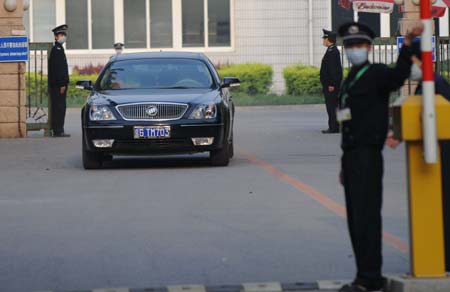|

|
|
A car carrying the quarantined passengers from the Mexico City-Shanghai flight AM098, where a Mexican man was confirmed to be infected with influenza A/H1N1, runs out of the gate of the Guomenlu Hotel in Beijing, China, May 7, 2009. The passengers quarantined in the Chinese mainland who took the same flight with the Mexican were out of quarantine on Thursday.[Xinhua/Li Wen]
|
Chinese health authorities on Thursday started lifting a seven-day quarantine on passengers from the Mexico City-Shanghai flight AM098, where a Mexican man was confirmed to be infected with influenza A/H1N1 on May 1.
A Mexican woman, one of the six Mexican nationals aboard the flight, who volunteered to stay in east China's Shanghai for the quarantine, Thursday left the hotel where she had been staying for quarantine.
"I love Shanghai. I've worked and lived here for four years, and I will continue to stay here," said the woman, who declined to give her name.
About 110 people on the same flight were under quarantine after a virus carrier was found in Hong Kong.
A Mexico chartered flight took most of the Mexican nationals and 13 crew aboard the flight back to the country on Tuesday.
"I didn't take the chartered plane, because I want to be with my family in Beijing. We've been here for two years," said Carrillo Morales, a Mexican who was one of two Mexicians volunteered to stay quarantined in Beijing.
He said hotel staff consulted his favorite food while he was under quarantine.
"I told them I like roast Beijing Duck. I didn't expect they did send people to buy me one from Beijing's famous Quanjude Restaurant. I think they did their best to make us comfortable," he said.
Chinese health authorities said Wednesday none of the people under quarantine in China had displayed any flu symptoms so far.
The A/H1N1 flu has so far killed 42 and infected 1,070 more in Mexico after the first case was detected in March.
A World Health Organization (WHO) officer on Wednesday praised China's efforts to prevent a possible pandemic of the virus.
"China's experiences with SARS and avian influenza have prepared it well for the current situation with influenza A/H1N1," said Vivian Tan, communications officer with the WHO China.
Zhong Nanshan, a Chinese academician who is respected as a hero in China's fight against severe acute respiratory syndrome (SARS), said on Thursday that China's prevention measures against the influenza A/H1N1 is "necessary".
"Quarantine is the best way to prevent the epidemic from spreading when it is at peak," he said.